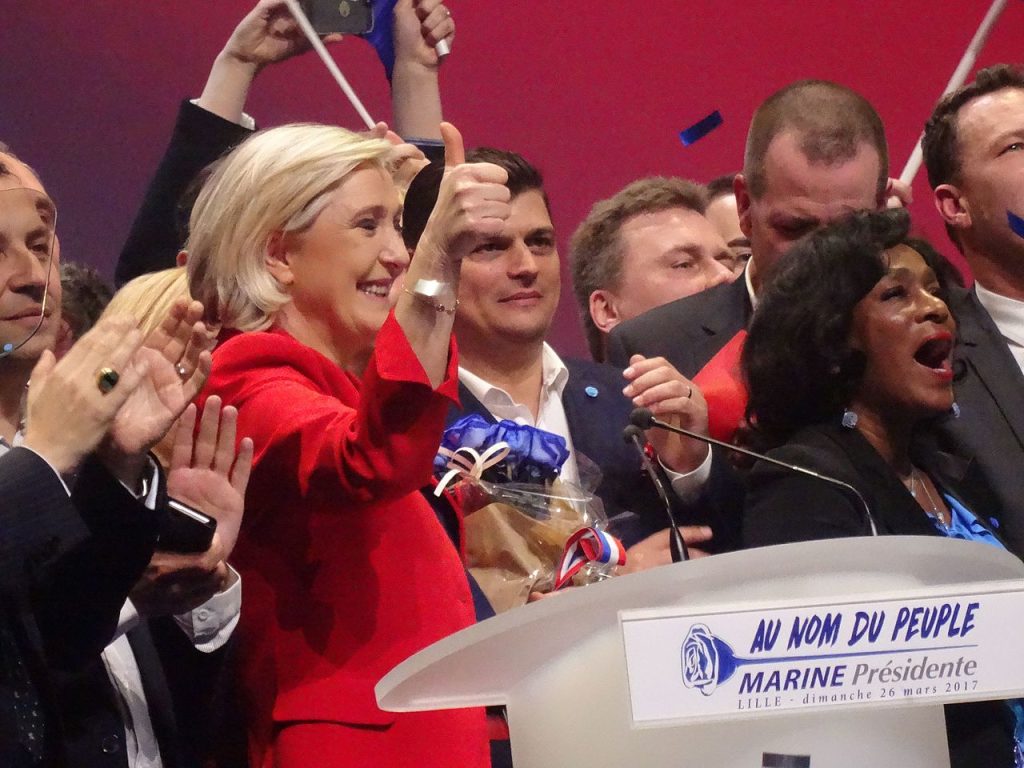Bargain-basement nationalism
Marine Le Pen’s mainstreaming of the Rassemblement national involves cutting ties with radical elements and promoting defectors from other parties. The result is an incoherent mix of pragmatism, nationalist demagogy and even progressivism – and a party without a common culture.
On 21 May 2013, the French writer Dominique Venner shot himself in the head in front of the altar at Notre-Dame cathedral in Paris. An identitarian, racialist and defender of the ‘long European memory’ (a belief that ascribes a common ethnic origin to the continent’s civilization), Venner had been out of politics for a long time. However, the relationship the Front national (FN), later the Rassemblement national (RN), has with his legacy sheds light on the evolution of the party and its willingness or otherwise to acknowledge its far-right tradition.
Venner was not a devoted fellow traveller of the FN. But his writings – above all the accounts of his life as a young fascist imprisoned in Gaullist jails after the Generals’ Putsch of 1961, and later as an aesthete who loved hunting and neo-pagan solstice festivals – have been favourites among several generations of FN activists.
For the RN’s young supporters, Venner represents both activist aristocracy and the figure of an engaged intellectual in a political clan whose traditional heroes became taboo after 1945. Venner’s suicide successfully turned him into a myth. In a letter read out by the historian Bernard Lugan on the rightwing broadcaster Radio Courtoisie, Venner explained his actions as necessary to ‘break the lethargy that afflicts us’ and claimed he was a martyr to the ‘great replacement’, the racist idea that white Europeans are victims of a ‘genocide by substitution’ as a result of immigration.
The day after his death, no-one was surprised to see a tweet commending his legacy from Marine Le Pen, by then had been president of the FN for two years: ‘All respect to Dominique Venner, whose final, eminently political act was to try to wake up the people of France.’ At that time, Le Pen was still embracing the heritage of her political clan.

Marine Le Pen at a rally before the 2017 French presidential elections. Source: Wikimedia Commons
Getting back in line
Ten years later, her relationship with France’s far right has changed. Le Pen did not flinch when the tribute to Venner organized by the Institut Iliade (a far right think tank founded to further Venner’s thought) was banned by prefectorial order in May 2023. Only two years before, the RN had protested against the dissolution of the far-right movement Génération identitaire, despite this group being more violent than the Institut Iliade, which limits itself to organizing lectures and running courses. ‘On this question as on all others, the RN followed Marine’s instructions: take cover, silence in the ranks,’ remarked Jean-Yves Le Gallou, cofounder of the Institute. ‘But we received lots of messages of sympathy in private.’
Although many activists and senior figures in Le Pen’s movement continue to venerate Venner privately, public homage is no longer welcome. When the student union La Cocarde – which is not affiliated with the RN but provides many of its parliamentary assistants – commemorated Venner on its social networks, the number two in the RN group in the National Assembly, Jean-Philippe Tanguy, brought those concerned to order. Although there was no mention of Venner in the reading list of the youth wing of the RN (Rassemblement national de la jeunesse – RNJ) published in summer 2023, it was compiled by Pierre-Romain Thionnet, the president of the youth movement, a fan and true connoisseur of Venner’s work.
Identitarians are not the only groups with whom the RN is trying to cut ties (or wants to be seen to be doing so). Anyone with a link to violence or radicalism is instructed to remain out of the spotlight. At the demonstration against the banning of the Venner Tribute on 9 May 2023, organized by the nationalist and anti-semitic student organisation Groupe union défense (GUD), images of activists in hoods and masks brandishing the Celtic cross (a neofascist symbol) shocked public opinion. Several RN spokespeople demanded the dissolution of the GUD and all violent extremist factions. However, figures close to Marine Le Pen confirmed their links to the group. At least two of the young demonstrators, one of whom had already been found guilty of violent offences, were identified by Libération as regularly attending the RNJ’s weekly lectures at the party’s headquarters.
Steeped in a far-right ideology that they are no longer allowed to openly embrace, RN activists now belong to a party without a real common culture. Among the key figures promoted by Le Pen, pride of place goes to defectors from traditional parties. Above all, the party’s narrative has lost its coherence. Le Pen has unpicked the far-right folklore that characterized her father’s party, but she is now left with something threadbare. This situation partly explains the emergence of Éric Zemmour. Moreover, it invites the question as to whether the RN still a far-right party that is hiding its true nature, or whether, through the arrival of defectors and the abandonment of swathes of its programme, it has lost its ideological coherence in favour of a patchwork of nationalism, radical rightwing thought, populism, pragmatism, demagogy and even some elements of progressivism. Is this a strategy of subterfuge or bargain-basement nationalism?
Marine Le Pen’s party muddies the waters. The media narrative calls this ‘de-demonization’ – a problematic neologism, since it originates in the FN camp and suggests that the ‘system’ is responsible for the ‘demonization’ of the party, as supposedly the only anti-establishment party working in the interests of French people. As if Jean-Marie Le Pen never played with transgression (racism and antisemitism) or emphasized his unique position on the political spectrum. Self-demonization involves cultivating one’s uniqueness and styling oneself as a victim justified in making attacks because of the persecutions one suffers. Described as Marine Le Pen’s strategy to climb the greasy pole of power, ‘de-demonization’ is as old as the FN itself.1
Inside institutions but not part of the system
Is de-demonization still the RN’s strategy? Things have become less certain now that the party has eighty-eight deputies (elected representatives sitting in the Assemblée nationale) and presents itself as ‘inside institutions but not part of the system’. In 2023, the mission for Le Pen’s deputies is apparently to blend in. To her troops, Marine Le Pen has given them the same advice as Jean-Paul Sartre’s grandmother in Les Mots: ‘Gently, mortals, be discreet!’ It is better not to be noticed at all than to be noticed for the wrong reasons. ‘They are obsessed with making sure there are no slip-ups’, claimed a veteran of the right wing.
The fact is, there was no parliamentary far right to speak of before the legislative elections in June 2022. Of the eight FN politicians elected in 2017, only three deputies remained: Le Pen, Bruno Bilde and Sébastien Chenu (as well as two replacements who took office near the end of the term). Among those who entered the Assembly, only a handful had parliamentary experience: Jean-Philippe Tanguy and Alexandre Loubet had worked there for Nicolas Dupont-Aignan, and Florence Goulet had supported Henri Guaino. ‘We were starting from zero’, summarized Renaud Labaye, the general secretary of the group. ‘We had to create an organization of two hundred and fifty people from nothing and have it running straight away.’
The new recruits were kept in line. Among the senior figures, many were not longstanding party members. Chenu joined the FN in 2015, as did Franck Allisio, a spokesperson for the group. Both came from the Union pour un mouvement populaire (UMP, renamed Les Républicains in 2015) and continued to be on good terms with their former colleagues. Jean-Philippe Tanguy, the group’s number two, together with his friend Alexandre Loubet and Thomas Ménagé, the RN’s representative on the Law Committee and the party’s frontman during the debate on retirement reform, came from Debout la France, Nicolas Dupont-Aignan’s small sovereignist party. They overshadowed Le Pen’s older supporters, such as Frédéric Boccaletti, deputy for Le Var, who ran a bookshop carrying Holocaust-denying books and was sentenced to a year in prison (released on parole after six months) for joint enterprise racist violence. Another was José Gonzalez, député for Les Bouches-du-Rhône and currently the oldest member of the National Assembly, who praised French Algeria when giving the opening speech for the sixteenth parliamentary term.
In fact, the FN/RN has always given prominent roles to defectors, whether they have come from the UMP, from the left (Andréa Kotarac, formerly a member of La France Insoumise, head of the RN list in Auvergne-Rhône-Alpes and a spokesperson who works directly with Le Pen), or from civil society (Hervé Juvin, Member of the European Parliament, from whom the RN distanced itself at the end of 2022 after he was convicted of domestic violence). For backbench politicians, joining the RN opens up access to posts that would be out of reach in their former parties, and allows them to extend careers that are coming to an end. This has been the case for Jean-Paul Garraud and Thierry Mariani, both elected MEPs in 2019, who came from Les Républicains.
In return, Marine Le Pen gets to dilute the far-right character of her party. If the old guard gnashes their teeth, so much the better: it proves the boss wants to change the party she inherited from her father. Defections are essential to the theatre of Le Pen’s ‘de-demonization’, where she now plays opposite Éric Zemmour. There is no need for a crystal ball to predict that the RN’s list in the 2024 European elections will prominently feature newcomers from other political backgrounds.
RN deputies are expected to attend the Assembly assiduously, although this is often less useful than time spent in committees, where they have shown less agility and effectiveness than other parliamentary groups. When the group meets each Tuesday morning, the secretary-general Renaud Labaye repeats his slogan: ‘We aren’t here to have fun.’ The troops are scolded when they lose their composure: ‘Stop your nonsense, think of the impression you’re making’, orders Sébastien Chenu or Jean-Philippe Tanguy when they get too excitable.
Conscious that it is through appearing serious (as opposed to being serious) and by building relationships with MPs from other groups (more than their skill in influencing parliamentary business) that the RN will score points, Le Pen’s deputies are careful to be especially polite and obliging towards their colleagues. Along with this collegiate approach goes a ‘constructive’ political strategy: vote for all legislation that goes in the right direction, even if it does not go far enough, and even if it comes from the left. The RN expects the same thing from its opponents and bemoans their sectarianism when they do not support relatively anodyne legislation.
The RN’s parliamentary niche in January 2023 indicated a desire to depoliticize, and in so doing to pull the rug from under their regular critics. Out of the nine pieces of legislation tabled, two were copied almost word for word from other rightwing groups and the majority party. None related to immigration or ‘national preference’ (giving priority to French citizens), although one text did propose establishing a presumption of legitimate defence for those working in law enforcement. The RN put forward legislation ‘which corresponds to the concrete concerns of citizens’, Le Pen maintained: the removal of low-emissions zones, deputies to be elected by single-round proportional representation, recalculation of the tax for domestic rubbish collection, etc. Its positioning in the fight against the retirement age reforms – opposing the reforms in the parliament and the media while remaining absent from the protests – also showed that the RN prefers to hold back, even to the point of looking idle. Marine Le Pen intends to table mainly consensus-building legislation during the RN’s next parliamentary window in October.
‘People say that they have succeeded in the first stage of their term of office because they haven’t pissed on the carpet, but the reality is that they haven’t done anything,’ summarized a former RN member who has switched allegiance to Reconquête! (the party founded by Éric Zemmour in 2021). What has been called a ‘suit and tie approach’ – a readiness to blend into the institution – has never been a concerted strategy. ‘All of that is nonsense, people realize that we are not savages and they think that it’s a strategy’, said Nicolas Meizonnet, RN deputy for Le Gard, doubtless aware that doing nothing is a strategy in itself.
It is also deployed outside of the National Assembly. Party activists are allowed to hand out leaflets in the street, but when plans for an asylum centre or facility for unaccompanied minors are made public, the leadership forbids the faithful from taking part in demonstrations. During a protest in Saint-Brévins (Loire-Atlantique), at least a dozen RN activists told Libération they were there incognito. Those higher up accept that they can only participate in events over which they have absolute control. This is why Le Pen abandoned the traditional 1 May parade past the statue of Joan of Arc in Paris, which always attracted the skinhead faction, and why ‘blue, white and red’ festivals, at which bookstalls always featured works by Brasillach, Venner, or Saint-Loup, are no longer allowed. Instead, on 1 May 2023 the party held a ‘festival of the nation’ in Le Havre. It took place in a closed auditorium far from the town centre: this was the far-right vacuum-packed for the media, with no chance of spoiled goods being on show.
In the shadows
But it is doubtful whether this attempt to improve the RN’s image can totally mask its true nature. Alongside the high-ranking defectors Marine Le Pen likes to showcase, others lurk in the shadows whom the party seems unable or unwilling to do without.
One example is e-Politic. The company takes care of the RN’s communications and is 45 percent owned by two former members of the far-right student organisation Groupe union défense (GUD), who are still very close to the nationalist-revolutionary movement. While the party maintains that e-Politic is simply a service provider, many of its staff are also party activists, or even elected representatives. Sometimes it becomes difficult to tell the difference between the two organizations.
‘It’s an incubator’, explains a senior member of the RN who used to work for the agency. ‘Working for them means doing comms, looking deeply into issues, following the news, developing political instincts… It’s really formative.’ The work of e-Politic is essential in a context where the RN currently has no training structure for its younger members, nor the means to compensate its foot soldiers. Among those who surround Jordan Bardella, RN’s president, are two senior figures trained at the company. Both came through the FN’s youth wing, just like Paul-Alexandre Martin, the founder and now majority shareholder of e-Politic. Martin is generally considered the spiritual heir to Frédéric Chatillon, former leader of the GUD, and close friend of Marine Le Pen.
Martin’s radical roots have also led him to recruit within far-right movements. The company notably employed a young RN parliamentary assistant with links to neo-Nazi groups for several years, as well as activists from Alvarium, an Angers far-right faction dissolved in November 2021. The whiff that emerges from e-Politic has led Bardella to commit to bringing party communications in-house insofar as is possible. In 2020 the party, faced with financial difficulties, dispensed with almost all of its communications team. The man responsible for axing the jobs was the MEP Jean-Lin Lacapelle, the RN’s ‘HR man’, but also close to the ‘GUD connection’ and known to be a friend of Frédéric Chatillon.
Looking at the RN delegation at the European Parliament, where management is less heavy-handed than in the Assemblée nationale, one can see evidence of all the things that the party tries to sweep under the rug. Foremost among them are networks linking the RN to the New Right. David L’Épée, a close associate of Alain de Benoist, the intellectual figurehead of New Right, was invited speak to the European Parliament on the dangers of ‘wokeism’. His second speech was cancelled by the RN after Libération published an article revealing his links with Alain Soral, another far-right ideologue, as well as his promotion of an antisemitic artist and his speeches on gender ideology, which L’Épéeclaimed was a plot by George Soros to persuade white people not to have children and thus to enable the ‘great replacement’.2
To fill in for L’Épée’s at the last minute, the RN called on another figure from the same circles: François Bousquet, editor of Éléments magazine, also close to de Benoist and Jean-Yves Le Gallou, a former MEP for FN and now member of Zemmour’s party Reconquête. In such settings, subtle signals are important: they allow people to recognize one another. Thus, in Bousquet’s Nouvelle Librairie bookshop, there is a stuffed boar’s head presented by Gilles Soulas, who ran a bookshop in the 1990s that carried antisemitic and Holocaust-denying works.
Antisemitism is alive and well within the RN, on whose premises the motto of collaborationist Jacques Doriot is still displayed: ‘The Party owes you nothing, you owe the Party everything.’ This summer, at summer schools run by the fundamentalist party Civitas, the essayist Pierre Hillard suggested stripping Jews of their citizenship, in a caricature of Catholic antisemitism that the RN quickly denounced. However, at least two of Hillard’s close associates have connections to the RN. One of them, Sylvain Durain, was invited to the European Parliament in March, despite having denounced ‘a major Jewish infiltration within global organizations such as the Red Cross, human rights organizations, NGOs, and also – or should I say most of all – the Church.’ The other, Thibault Kerlizin, is the author of studies paid for by the RN, including one on the ‘influence of NGOs’ on the European Union. In it, he cites the private newsletter Faits et documents, which speaks of Jews as an ‘organized community’ and started a rumour that Brigitte Macron was a trans woman.
These networks are not without influence on France’s largest opposition party, which periodically expresses a frankly conspiracist vision of the world. Thus, on 1 May 2023, Marine Le Pen denounced the French president, ‘wokeism’, the Green’s ‘perverted’ ecology, and the European Union in terms laden with connotations: ‘There are transitions to which our times lead us … but there are also others that small coteries invent, “the demographic transition”, and finally those that are quietly established, without anyone talking about them, behind the backs of European populations, the “transition of civilizations”.’
Among Le Pen’s targets was the relocation of asylum seekers ‘currently underway in many villages’, which she referred to as a ‘migratory flood scheme’. She used numerous circumlocutions to avoid espousing the racist theory of the ‘great replacement’. It is unsurprising that her speechwriter, Philippe Olivier, is not a last-minute defector, but an authentic far-right activist whose networks are intertwined with his sister-in-law’s party.
But apart from a few fundamentals, foremost among them ‘national preference’ (putting French citizens first), it is difficult to discern a clear RN position. Le Pen has followed a stubbornly populist route in economics, which distances her from a liberal rightwing position, but also a socialist one. Even on those issues at the heart of her doctrine, the head of the RN enjoys defying expectations. Thus, during the presidential campaign, Le Pen quietly abandoned her commitment to abolishing dual nationality. This dogma was a crucial marker of nationalism, intrinsic to the exclusive nature of nationality that is either inherited or earned. ‘I have met thousands of people’, she said, ‘who legally cannot renounce their nationality because their country forbids it. Honestly, I’d rather set that all aside, as it’s like rubbing salt into a wound.’
Without denying that Le Pen has the capacity to change her mind, it is noteworthy that this idea was justified within the party by the necessity that citizenship can be withdrawn: anyone who only has a French passport cannot be deported. It should also be noted that the RN still proposes drastically limiting bi-nationals’ access to jobs in ‘sovereign’ sectors such as defence, policing and justice: ‘No-one can have two allegiances’, argued the secretary-general of the group in the National Assembly, revealing his implicit position that those with dual nationality are not as French as everyone else.

Published in cooperation with CAIRN International Edition, translated and edited by Cadenza Academic Translations.
See Alexandre Dézé, Le Front national: A la conquête du pouvoir? (Paris: Armand Colin, 2012).
See Nicolas Massol, Maxime Macé, and Pierre Plottu, ‘Contre le wokisme, le RN enrôle un compagnon de route de nombreux antisémites’, Libération, 13 April 2023.
Published 20 November 2023
Original in French
Translated by
Cadenza Academic Translations
First published by Esprit 10/2023 (French); Eurozine (English)
Contributed by Esprit © Nicolas Massol / Esprit / Eurozine
PDF/PRINTPublished in
In collaboration with
Newsletter
Subscribe to know what’s worth thinking about.
Related Articles

The climate of hostility in which the assassination attempt on Robert Fico took place has been a feature of Slovak politics for the past two decades. And Fico has played a decisive role in creating it. How the situation in Slovakia came about – and whether it will continue to deteriorate.

TikTok populism
A Europe Day special
Young voters are getting more engaged in European politics, but this growth starts from a very low point. Radicalization is increasing, and most people connect with politics emotionally and through communities. The EU holds vast power and potential, but how can it engage young people ? Standard Time’s Europe Day episode premiering today at 5 PM CET.





